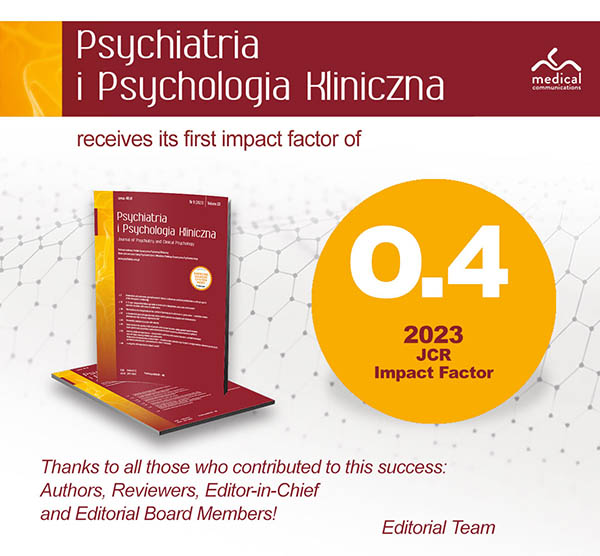Borderline personality disorder – current psychotherapy guidelines
Agnieszka Popiel1,2
 Affiliacja i adres do korespondencji
Affiliacja i adres do korespondencjiBorderline personality disorder affects about 1–1.5% of the population. It is characterised by chronicity (from adolescence to adulthood) and a significant suicide rate (about 10%). Spontaneous improvement can be observed in some patients; however, it is estimated that specialised therapy accelerates this process several times. Psychotherapy is the recommended treatment for those with borderline personality disorder; however, it is necessary to specify the methods and principles of its application. Data from research on effectiveness (ranging from strong support to modest/controversial results requiring replication) focus on a few psychotherapy methods: dialectical behavioural therapy, schema therapy (belonging to the cognitive-behavioural approach), as well as mentalisation-based therapy and transference-oriented therapy (belonging to the psychodynamic/psychoanalytical approach). The aim of the article is to present the recommended psychotherapy methods for patients with borderline personality disorder included in the guidelines developed by institutions referring to the principles of evidence-based practice – a tripartite approach where the basis of practice is recognising methods whose effectiveness has been demonstrated in empirical studies (evidence-based treatments). We also referred to the recommendations of the American Psychiatric Association, the American Psychological Association, and the National Institute for Health and Clinical Excellence. In the summary, the principles for psychotherapy in borderline personality disorders, common to many recommendations, including the diagnosis, risk management, therapy time planning, structure, discontinuation of psychotherapy and supervision, are also discussed. According to the guidelines (American Psychiatric Association, American Psychological Association and National Institute for Health and Clinical Excellence), pharmacotherapy plays a supportive role in the treatment of borderline personality disorder, but it should be considered in the coherent treatment plan and case management – therefore the main recommendations for pharmacological treatment are also discussed.















